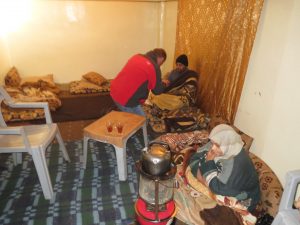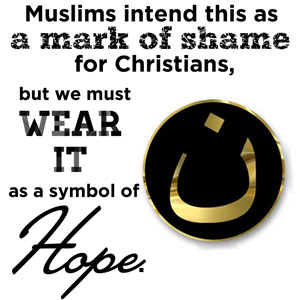 Many Iraqi minorities, Christians in particular, supported Donald Trump in his fight for the presidency, especially with his promises to put an end to ISIS and to make those suffering from genocide a priority. However, Trump’s recent executive order that banned immigration for 90 days from seven countries, including Iraq, has left many Iraqis wondering where Trump’s priorities lie.
Many Iraqi minorities, Christians in particular, supported Donald Trump in his fight for the presidency, especially with his promises to put an end to ISIS and to make those suffering from genocide a priority. However, Trump’s recent executive order that banned immigration for 90 days from seven countries, including Iraq, has left many Iraqis wondering where Trump’s priorities lie.
Al-Monitor sat down with Iraqi Christians to find out their thoughts on the executive order. Rabie Patros Younis, a deacon and Christian community activist in al-Qosh, said: “To be honest, Iraq used to be full of Christians. After 2003, we Christians started to get the idea that we have no place in the region,” referring to the violence that hit religious minorities especially hard after the 2003 US-led invasion.
Younis continued on to say: “We’ve been waiting for someone to come change our reality. Since 2003, it’s only gotten worse… Trump was against extremism. Obama spoke against it, but in eight years, things only got worse. So Trump said he would change that.”
According to al-Monitor, many Iraqi Christians are questioning their support for Trump because the immigration ban leaves Christians in Iraq with one less place to seek out for safety.
“It was just hope. If we feel the situation changing for the better, then we can say, ‘Trump is the right person for the job.’ We’re waiting. Right now we don’t have trust in anybody.”
For another al-Qosh resident, Yosef Qasyanon, Trump’s executive order blocked his departure from Iraq just as he was about to join his family in the US. Qasyanon told al-Monitor: “I went through the visa process! I was hoping to go to America. The process was under the [Special Immigrant Visas for Iraqis] program. But everything has stopped now because of that order.”
Al-Monitor reported:
Qasyanon said that communities were becoming more ethnically segregated, noting that these days he only feels comfortable among fellow Christians from al-Qosh. Threats from jihadist groups like IS, tensions with neighbors, and land seizures in areas under Kurdish control have all contributed to the continuing sense of insecurity among his community.
Although Qasyanon appeared to approve of Trump’s aggressive attitude, his disappointment with Trump’s ban runs deep. “Trump makes things happen,” Qasyanon said, noting that Trump was keeping his promise to push through certain policies during his first days in office. “I had an application, I did an interview, and I had a visa. This isn’t just a ban on Muslims. This is a ban on everyone.”
Qasyanon was resigned when asked whether he would try to appeal his case for travel. He said there was nothing else to do except wait for a change in policy.
As for the Christian community across northern Iraq, Qasyanon remarked that their numbers were dropping precipitously on the Nineveh plain. “You know, we shrank from one and a half million in Iraq to no more than 300,000 now,” he asserted. “It was security that pushed them to go, despite the fact that they had houses, salaries, enough money to put in the bank.”
Qasyanon added, “If the security situation improved, the [Christians] would stay. But ever since Daesh [IS] came, everything has changed.”
To read the rest of the article, click here.
While the Islamic State has been run out of the Nineveh Plain but Kurdish forces and Christian militia forces, these displaced Christians are returning to their homes to find their homes destroyed, churches vandalized and their personal items damaged or stolen.
There is a huge need for disposable diapers in these camps. The inability to wash reusable diapers, or old clothes used as diapers, had led to outbreaks of diseases and illness in children and families in the camps.When ISIS took control of the Nineveh Plain in 2014, Christians were given an ultimatum: convert to Islam, pay a tax, or die by the sword. Many Christians fled their homes taking absolutely nothing with them.
They were forced to leave behind the luxuries they had known and live in basements of abandoned buildings or modified storage containers that aren’t equipped to keep warm during the winter.
 The Diapers for Refugees program started when William J. Murray, chairman of Religious Freedom Coalition, met with RFC’s Iraqi ministry partner and asked what the refugees were in most need of. The ministry partner explained how desperately mothers needed diapers for their families. In March of 2016, the Diapers for Refugees program made its first delivery of 160,000 diapers to displaced Christian families. In December 2016, the Diapers for Refugees program reached our goal of delivering 640,000 high quality disposable diapers to Christian families in need.
The Diapers for Refugees program started when William J. Murray, chairman of Religious Freedom Coalition, met with RFC’s Iraqi ministry partner and asked what the refugees were in most need of. The ministry partner explained how desperately mothers needed diapers for their families. In March of 2016, the Diapers for Refugees program made its first delivery of 160,000 diapers to displaced Christian families. In December 2016, the Diapers for Refugees program reached our goal of delivering 640,000 high quality disposable diapers to Christian families in need.
For every donation given in February, you will receive a free Nun pin as a gift. Thank you for your support.
To find out more about the Diapers for Refugees program, click here.
